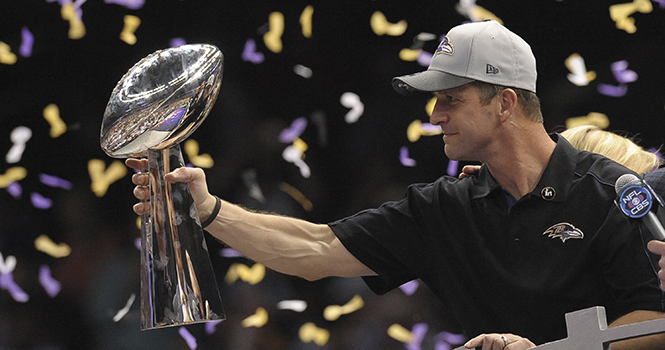Lights out: Ravens beat 49ers 34-31 in Super Bowl
Baltimore Ravens coach John Harbaugh holds the Lombari Trophy at the end of Super Bowl XLVII at the Mercedes-Benz Superdome in New Orleans, Louisiana, Sunday, February 3, 2013. The Baltimore Ravens defeated the San Francisco 49ers, 34-31. (Gene Sweeney Jr./Baltimore Sun/MCT)
NEW ORLEANS (AP) — A power outage at the Super Bowl put the nation’s biggest sporting event on hold for more than a half-hour Sunday, interrupting an otherwise electric, back-and-forth game that ended with Joe Flacco and the Baltimore Ravens as NFL champions thanks to a 34-31 victory over the San Francisco 49ers.
Flacco, voted the MVP, threw three first-half touchdown passes to cap an 11-TD, zero-interception postseason. Jacoby Jones returned the second-half kickoff 108 yards, a Super Bowl record, to give Baltimore a 28-6 lead.
Moments later, lights lining the indoor arena faded, making it difficult to see. When action resumed, Colin Kaepernick and the 49ers scored 17 consecutive points, getting as close as 31-29.
The AFC champion Ravens (14-6), a franchise that moved from Cleveland to Baltimore 17 years ago, improved to 2-0 in the big game. They also won the championship in 2001, when linebacker Ray Lewis was voted the game’s MVP. Lewis was not a major factor this time, but he was a center of attention, playing in the final game of his 17-year career before retiring.
The 49ers struggled early in the first Super Bowl coaching matchup between brothers: Baltimore’s John Harbaugh is 15 months older than San Francisco’s Jim Harbaugh.
Baltimore led 28-6 after Jones opened the second half with the longest kickoff return in a Super Bowl, his eyes glancing up at the videoboard, presumably to watch himself sprint to the end zone. The 49ers showed they were capable of a comeback in their previous game: They trailed by 17 against the Atlanta Falcons before winning the NFC championship game.
Shortly following Jones’ return, the sudden, odd power outage arrived. Escalators weren’t working. Officials stopped play about 1½ minutes into the third quarter, and the bizarre delay lasted 34 minutes in real time before action resumed. Some players sat. Others stretched. Some fans chanted, “Let’s go, Ravens!” Others passed time by doing the wave.
This was the 10th time New Orleans hosted the big game — tying Miami for most in a city — and first since Hurricane Katrina devastated the Big Easy in August 2005.



